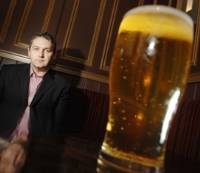 I’ve been watching William Crawley’s new documentary, Dying for a Drink, in which he explores his own personal relationship with alcohol and that of Northern Ireland society in general. William and producers did a great job, and explored the subject thoroughly.
I’ve been watching William Crawley’s new documentary, Dying for a Drink, in which he explores his own personal relationship with alcohol and that of Northern Ireland society in general. William and producers did a great job, and explored the subject thoroughly.
Northern Ireland is an interesting place with regard to alcohol. First, it’s part of Ireland. When people here in the United States hear that I’m not a big drinker, they act surprised and exclaim, “What, and you’re Irish?” If there is a ‘drinking gene’ in the Irish people, somehow I didn’t get it, but it may explain Northern Ireland’s problem with alcoholism. Second, it is home to a religious culture which emphasizes a zero-drinking polcy, making Northern Ireland what Will describes as the “teetotal capital of Europe”. This creates an interesting dichotomy: an ‘all or nothing’ society where a lot of people fall into the extremes of excess or abstinence.
One of the things I liked upon coming to America was the ‘light’ drink culture. Sure, there is binge-drinking – isn’t America the land of extremes? – but most alcohol is consumed socially without excess. America is home of the light beer, where it is served in movie theaters, at sporting events and at fast food outlets. Most restaurants here are licensed to serve alcohol, and brightly-lit, modern sports bars are the most popular form of licensee, where patrons come in and have a few drinks while socializing and keeping up with 24-hour news and sports action before heading elsewhere.
All of this suits me very much, since I tend to be a very light drinker. Honestly, I’d usually prefer a good Coca-Cola, iced down in a big cold glass. Occasionally I’ll throw some rum in with it, or I’ll have a glass of wine (though never instead). The feeling associated with alcohol consumption doesn’t agree with my sense of control freakery, or my insatiable appetite for thinking. Of course, some very thoughtful people, and indeed some very intelligent people, have turned to alcohol as a way of ‘switching off’ the thought process and getting some respite from the consequences of thinking too much (such as a depression about the reality of things).
During the period William spent abstaining from alcohol for this documentary, he mentioned in his video diary was that he was finding it difficult to enjoy socializing with others who were drinking, so he just stayed home. I’ve never found that, although sometimes the drinkers in a group have a strangely urgent need to make sure everyone around them is drinking too. Not long ago, I was in Las Vegas at a convention, and a well-known photographer was hosting a meet-up which Melissa and I attended. He’d been there drinking for a while, and welcomed us, telling me that he had a tab at the bar, that we should feel free to use it. I took Melissa’s order and went to grab our drinks on his tab. Later, we bumped into him and he spotted my Coke. “That doesn’t look like alcohol! You didn’t get that on my tab, I hope. Man, you’re not drinking? Sheesh. Aren’t you Irish? Jesus. I tell him to use my tab and he gets a Coke.” I never really worked out why he seemed to be so incensed about it; perhaps he wanted to ensure that everyone else was as wasted as he, lest he do something embarrassing in his drunken state that a sober person simply wouldn’t understand.
Whether you struggle with alcoholism or you never touch the stuff, we all have a relationship with alcohol. Tell me what yours is.

